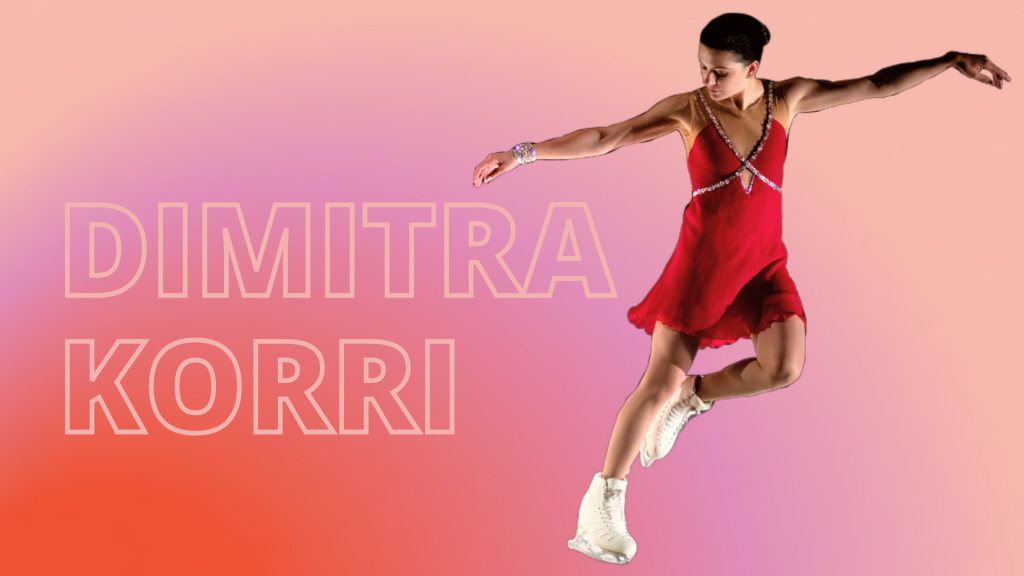Written by Malin Evita
*This interview has been edited and condensed for context.
When you Google “Dimitra Korri,” you will be greeted by a four-time Greek national figure-skater champion. But if you dig a bit deeper, you’ll find that the female Hermes is actually also a writer, musician, actress, and filmmaker. Since majoring in film at college, Dimitra Korri has written, produced, and directed various projects—from documentaries, short films, and recently, spectacular visual storytelling through music videos.
The music video for her Christmas single, Heaven Everywhere, which she starred in and directed, won the Best Music Video Award 2019 Culver City Film Festival and was selected for a slate of film festivals. The music video for Kitteh x Kitteh’s EDM song Quarantine Valentine is roaming through its festival circuit. The MV, filmed in a tunnel with LED lights, tells a story about a woman seeking an escape from her post-apocalyptic reality by playing a new VR figure skating game. As the lines between the real and virtual world start to blur, she enters a phase of disillusionment where she experiences failure, success and falls in love with her virtual opponent.
Dimitra, who directed, starred in, and choreographed the video, calls this her most ambitious and challenging project to date and sat down with me to tell you all about it. In this interview, the multi-talent artist touches on how ice skating and storytelling connects, her journey through it all, and how she has come to gain confidence in her craft.

Malin Evita: So, you have quite an interesting story with a mix of lots of artistry throughout your life. Tell me, from the beginning, when and how did you first connect with the arts?
Dimitra Korri: I started figure skating when I was five years old, back in Chicago at the Skokie Skatium. The rest is history; it kind of sucked out my soul, chewed up my heart, and I just could never stop doing it.
My dad actually, I don’t know if he would ever admit it, but he is really into films. And I don’t think he would ever want to take credit for me becoming addicted to being a filmmaker because he’s like, No, no, no! You need to do something that’s more secure in life! And I’m like, Trust me; I’m gonna make this secure.
But he always took us to the movies. My father works long hours, and the time we got to spend with him was in the theatre. So I think my father actually inspired that creative side of me in filmmaking from a young age without even realising it.
I think I discovered I had a knack for it, or a passion for it, in high school when I took my first video production class. They actually had us make a video about what our passion is, so my first video I ever shot on camera was of ice skating. I think the fact that I found a medium that could then present the other thing that I love most to people, which is figure skating, digitally and through other platforms, made it much more appealing to me because I was like, Oh my God, this is like a fusion of talents that are happening here!
ME: When you figure skate, how does it feel to you?
DK: I think it is a catharsis for me. If I had a bad day at work or anything else is bothering me, it is kind of like therapy. I go out on the ice, and nothing else matters. Everything just feels right.
It feels like you’re flying. I think it is the closest thing we have from literally, perhaps, being in a plane. It is kind of like you have wings on your feet! That’s how I would describe it—kind of like that Greek god, Hermes.

ME: What was it that made you feel brave enough to pursue all of these different, some would say risky, career paths?
DK: I just knew that I wanted to make a film. That I wanted to make an album, which I have yet to do, but I have some singles that are coming out now. And I also want to write a book. These are three goals that I had from a young age—I don’t know why.
I felt that I had a story to tell, and I needed to express it in all the mediums possible. Be it through song, text, or visual storytelling. I think it might just be the way my brain processes the world, and that is how I feel that I am able to continue living. If I wasn’t doing what I’m doing, I don’t know that I would still be here. So that’s my thing: I need to be able to go to my grave knowing I did everything possible to pursue this dream.
ME: Music, ice skating, directing. They are all very different in their own respect, but I can imagine you probably feel a link between them. When you direct, are there anything you take with you from your experience ice skating?
DK: Flow. Pre-production. General confidence in all of that. And I think to be confident on set, you have to put in the work in the days, weeks leading up to your set. I think figure skating has really trained me—because literally I train every day for this one event—and filmmaking is very similar. It is the same thing, preparing for shoot day or competition day. In that respect, it has made me very organised.
ME: How about creatively?
DK: I felt the biggest connection when we started filming Heaven Everywhere because it was like a performance, but it was fully staged, and we had control over the space. The fact that I was singing the words of the song while skating… Sometimes when I would skate my programs, I would be singing the song in my head, and now I was actually able to put it out there. It was kind of this hidden voice that I had.

ME: With Heaven Everywhere, it was you skating, filming, and singing your song. Do you ever feel vulnerable when you put so much of yourself out there?
DK: I felt the most vulnerable the first time I was in the studio, more so than when I was in front of the camera. Maybe because I’m used to that—being on set and stuff. Even when you are performing for competition, there is always a camera on you. So that wasn’t that crazy for me. What was weird was being in the studio, alone in the box, and the producers were in the other room. There’s a set time, and you’re trying not to drop all this money on studio time, so it’s like, Okay! We gotta get this done!
I felt a lot of pressure in that setting. That was the first time I was showcasing my voice—it wasn’t just my face or movement. It was coming from a much deeper internal place. So that was really vulnerable and a bit intimidating.
ME: How did you work through those nerves?
DK: They coached me, like, Go outside, maybe take a deep breath. Actually, I took a lap. I had to run to get my heartbeat up because then it felt like I was warming up for competition! So then I was like, Oh okay, we are just doing a skating program! Then I just sang the song like it was nothing.
ME: Since then, you’ve made the music video for Quarantine Valentine—tell me a bit about that.
DK: Quarantine Valentine is quite possibly the most insane project I have ever attempted to direct. Firstly because it was shot during the pandemic, and it was really hard to convince people to come onto an independent film set. They were like, What if I die on your set? And I’m just like, It’s gonna be okay! We are gonna enforce masks. It’s only going to be six people. So that was definitely a challenge.
The other thing was that we didn’t shoot in a real ice arena. We built our own rink in the studio with synthetic ice. Most people don’t even know this exists. It’s a thin plastic, it fits together like puzzle pieces, you hammer all of it in, and you’ve basically built a rink. So you can have ice in the middle of the dessert—which is what we did.
We didn’t have a lot of people; we weren’t allowed to have a lot of people. It was me, a P.A., and my co-star, Nick, hammering this ice together and also having to then not look sweaty, trying to look good on camera, and get into character. So that was another challenge.

It was my first time directing EDM. My capstone film in college was a music video that featured my brother, and he is a dubstep beatboxer. So I was familiar with the wubs and how to hit that, but the pacing of the song—the track actually changes BPM halfway through—that was another thing I had to take into consideration. Where do the shots speed up to match the music? And where can we do longer, more elegant shots?
I choreographed the whole thing as well. We had to find moves that looked kind of like Wii Sports or Sonic at the Olympics with the figure skating aspects. Then a little bit of DDR—steps that people could relate to like they played a fitness game. That was something else I definitely wanted to incorporate.
The fact that it worked… In the beginning, I was questioning the special effects because it was a lot of work. I was like, Do I really want to do this? And then I did like a really small section of it, and I was like, Oh my God, this is night and day. Now I actually feel like I’m in a video game. So I committed.
ME: For women who want to get into filmmaking, what is some advice you would give?
DK: If a man tells you something can’t be done, do it anyways and prove them wrong. And be confident because if anybody on set recognises even the slightest bit of insecurity or lack of preparation, they’re really not gonna listen to you or trust you. So you need to trust yourself and do all of the work you need to do so you can be in charge that day.
Quarantine Valentine is currently going through its festival circuit and will be released afterwards. Check out more of Dimitra’s work and keep up to date with her music videos on dimitrakorri.com and follow her on Instagram @DimitraKorri.
Written by Malin Evita
Evita is the host and producer of the podcast, Instagram curator, and a writer focused on script, cultural commentary, and film analysis. She is a Vocal grand prize winner and recently her HNC in Professional Writing Skills. Through storytelling, she aims to amplify empathy and human connectivity.
Website: malinevita.com | IG: @malinevita
You might also like…

Jaimi McPeek on Destigmatising OCD, Artistic Expression, and Her Upcoming Film ‘Flip of a Coin’
Written by Malin Evita

